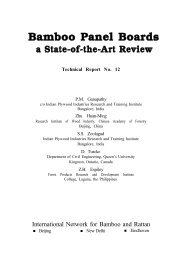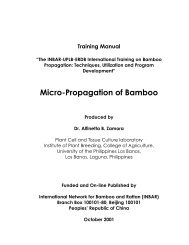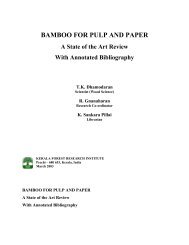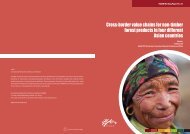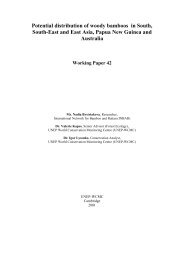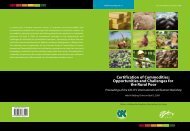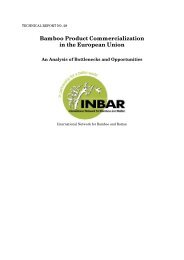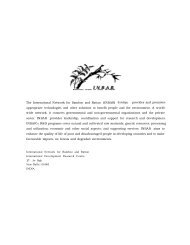The Bamboo and Rattan Sectors in Asia: an Analysis of ... - INBAR
The Bamboo and Rattan Sectors in Asia: an Analysis of ... - INBAR
The Bamboo and Rattan Sectors in Asia: an Analysis of ... - INBAR
You also want an ePaper? Increase the reach of your titles
YUMPU automatically turns print PDFs into web optimized ePapers that Google loves.
Further up the PCS, export regulations (or fiscal mech<strong>an</strong>isms apply<strong>in</strong>g to exports)<br />
have a strong impact on the sector, especially <strong>in</strong> Indonesia where ratt<strong>an</strong> production<br />
exceeds domestic consumption. In effect, such export barriers serve as a tax on raw<br />
material producers, <strong><strong>an</strong>d</strong> a subsidy to m<strong>an</strong>ufacturers <strong><strong>an</strong>d</strong> exporters <strong>of</strong> f<strong>in</strong>ished products.<br />
In other words, it re<strong>in</strong>forces <strong>an</strong> exist<strong>in</strong>g imbal<strong>an</strong>ce <strong>of</strong> power <strong>in</strong> favor <strong>of</strong> m<strong>an</strong>ufacturers<br />
<strong><strong>an</strong>d</strong> exporters to the disadv<strong>an</strong>tage <strong>of</strong> raw material producers.<br />
<strong>The</strong> ma<strong>in</strong> fiscal <strong>in</strong>centives operat<strong>in</strong>g <strong>in</strong> the ratt<strong>an</strong> sector currently are the taxes<br />
on the export <strong>of</strong> raw material that replaced the orig<strong>in</strong>al regulatory export restrictions.<br />
Indonesia <strong><strong>an</strong>d</strong> the Philipp<strong>in</strong>es have imposed such taxes. <strong>The</strong> effect is essentially the<br />
same as that <strong>of</strong> the regulatory mech<strong>an</strong>isms because the taxes are so high as to be<br />
prohibitive. However, unlike the outright b<strong>an</strong>, the tax mech<strong>an</strong>ism allows for some<br />
<strong>in</strong>cremental adjustment. That is, the tax could be reduced to encourage some exports<br />
<strong>of</strong> raw material while still keep<strong>in</strong>g prices down <strong>in</strong> the produc<strong>in</strong>g country. In Indonesia,<br />
for example, small-diameter c<strong>an</strong>e is available <strong>in</strong> surplus, <strong><strong>an</strong>d</strong> prices are so low that<br />
some ratt<strong>an</strong> gardens are be<strong>in</strong>g converted to other uses. At the same time, there is a<br />
dem<strong><strong>an</strong>d</strong> on the <strong>in</strong>ternational market for small-diameter c<strong>an</strong>e, <strong><strong>an</strong>d</strong> for semi-processed<br />
c<strong>an</strong>e products such as core <strong><strong>an</strong>d</strong> sk<strong>in</strong>. Indonesi<strong>an</strong> ratt<strong>an</strong> producers <strong><strong>an</strong>d</strong> semi-processors<br />
are, however, unable to cash <strong>in</strong> on this situation as export b<strong>an</strong>s <strong><strong>an</strong>d</strong> prohibitive taxes<br />
(<strong><strong>an</strong>d</strong> especially mech<strong>an</strong>isms that restrict the trade <strong>of</strong> semi-processed material) preclude<br />
sell<strong>in</strong>g to this market.<br />
<strong>The</strong> trade-<strong>of</strong>fs <strong>in</strong> this are difficult to measure. As the lead<strong>in</strong>g producer <strong>of</strong> ratt<strong>an</strong>,<br />
Indonesia may be <strong>in</strong> a position to exercise a degree <strong>of</strong> control over the market. By<br />
prevent<strong>in</strong>g raw material from enter<strong>in</strong>g the world market, they are able to <strong>of</strong>fer a tw<strong>of</strong>old,<br />
short-run competitive adv<strong>an</strong>tage to domestic ratt<strong>an</strong> products m<strong>an</strong>ufacturers:<br />
first, foreign competitors have reduced access to raw material <strong><strong>an</strong>d</strong> second, domestic<br />
raw material prices are kept relatively low. However, this adv<strong>an</strong>tage <strong>in</strong> the process<strong>in</strong>g<br />
sector is ga<strong>in</strong>ed at the cost <strong>of</strong> considerable foregone earn<strong>in</strong>gs for unprocessed <strong><strong>an</strong>d</strong><br />
semi-processed ratt<strong>an</strong> to the raw material producers <strong><strong>an</strong>d</strong> semi-processors. Moreover,<br />
the long-run effect <strong>of</strong> this artificial reduction <strong>in</strong> dem<strong><strong>an</strong>d</strong> for raw material maybe<br />
reduced production <strong>of</strong> raw material <strong>in</strong> the country. A new, lower, supply equilibrium<br />
may be reached with<strong>in</strong> the country as marg<strong>in</strong>al producers switch to other activities.<br />
Additionally, the policy may stimulate a further shift as <strong>of</strong>fshore competitors seek<br />
alternative source <strong>of</strong> raw material supply from non-traditional suppliers (different<br />
countries, cultivation) <strong><strong>an</strong>d</strong> reduce their ratt<strong>an</strong> requirements through substitution. <strong>The</strong><br />
study shows that these trends are already well underway.<br />
<strong>The</strong> ma<strong>in</strong> government <strong>in</strong>vestment <strong>in</strong> the bamboo sector has been <strong>in</strong> direct<br />
m<strong>an</strong>agement <strong>of</strong> bamboo resources (especially <strong>in</strong> India). Research has been limited <strong>in</strong><br />
most <strong>of</strong> the countries studied. Additionally, there are government-supported tra<strong>in</strong><strong>in</strong>g<br />
programs for artis<strong>an</strong>s <strong><strong>an</strong>d</strong> craft workers <strong>in</strong> several countries, <strong><strong>an</strong>d</strong> some limited<br />
assist<strong>an</strong>ce with trade <strong><strong>an</strong>d</strong> export promotion. Generally speak<strong>in</strong>g, there has been<br />
relatively little <strong>in</strong>vestment <strong>in</strong> the sector relative to its value ---- <strong>an</strong>other <strong>in</strong>dication that<br />
the sector is undervalued by governments.<br />
75



